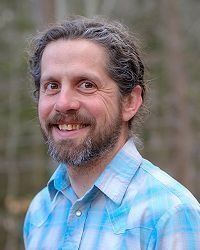
Patrick Fulton | How Cornell’s New 3-Km Deep Borehole Observatory (CUBO) Informs the Potential for Deep Direct-use Geothermal Heating on Campus
Abstract: Motivated by Cornell University’s aspiration to use geothermal heat to replace fossil fuels to heat campus buildings, in the summer of 2022, a 3-km deep geothermal exploratory well, the Cornell University Borehole Observatory (CUBO), was drilled on the Ithaca, NY campus. CUBO extends through largely low porosity and permeability Paleozoic sedimentary rocks above granulite-grade Grenville metamorphic basement rocks.
The main objective of CUBO is to explore potential fracture-dominated reservoir targets in both the sedimentary units and basement where temperatures are anticipated to range between 70 – 95 oC and help guide and de-risk decisions regarding the development of deep geothermal energy systems both at Cornell and elsewhere. CUBO is designed to be a dedicated observatory and testing borehole, separate from any future operational well pairs, and the resulting data and findings will be openly shared. The access to the subsurface provided by CUBO also permits ancillary experiments and investigations that advance our understanding of subsurface processes and conditions in general.
Here I will discuss the preliminary results of our analysis of the various geologic, hydrologic, logging, sampling, and downhole testing data acquired. I will also discuss the opportunities and general challenges associated with geothermal energy, and the important role earth scientists have in developing sustainable low-carbon energy solutions.
Bio: Patrick Fulton joined the faculty of Cornell’s School of Earth and Atmospheric Sciences (EAS) in January 2019. Fulton is an assistant professor and a Croll Sesquicentennial Fellow whose research interests include hydrologic and thermal processes within fault zones and how these processes either control fault slip behavior or provide insightful signatures within fault rocks. After post-docs in Oregon and Texas and a stint as a research scientist in California, Fulton took a faculty position at Texas A&M in 2016, where he taught for three years.
This event is presented as part of the 2023 Perspectives on the Climate Change Challenge Seminar Series:
Most Mondays, Spring Semester 2023, 2:45-4:00pm(via Zoom OR In person in 155 Olin Hall)This university-wide seminar series is open to the public, and provides important views on the critical issue of climate change, drawing from many perspectives and disciplines. Experts from Cornell University and beyond present an overview of the science of climate change and climate change models, the implications for agriculture, ecosystems, and food systems, and provide important economic, ethical, and policy insights on the issue. The seminar is being organized and sponsored by the Department of Biological and Environmental Engineering and Cornell Atkinson Center for Sustainability.